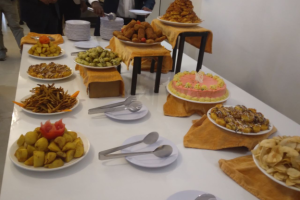
“At 19-years-old, Betelhem Dessie is perhaps the youngest pioneer in Ethiopia’s fast emerging tech scene, sometimes referred to as ‘Sheba Valley’.
She is coordinating a number of nationwide programs run by robotics lab iCog, the Addis Ababa based artificial intelligence (AI) lab that was involved in developing the world famous Sophia the robot.” This is the introductory part of a report CNN did last October on Ethiopia’s rapidly growing technology and innovation activity.
We now live in a world where technological innovation has taken center-stage, and the competition has become knowledge-based. Developing countries like Ethiopia have to catch-up if they are to survive and cope up with the challenges of an intensely competitive and rapidly evolving global economy.
In the midst of some promising technological innovations, Ethiopia is chosen to house East African e-commerce center, while Ministry of Innovation and Technology recently launched a program called “Two Two Two Two”, which aims to create an enabling environment to create 2 billion USD, 20 thousand jobs and 2000 small and medium technology enterprises.
What’s ushering the rapid development? In my view, says Sandokan Debebe, Director General of Technology and Innovation Institute, there are pushing factors that contributed to the burgeoning activity that we are seeing in technology and innovation. Externally, the national, continental and global setting is now majorly determined by technological capability, rather than natural resources where in the past countries depend on them. The internal pushing factors have to do with improving the competitiveness of our export. Countries that churn out competitive export goods use advanced technology and innovation to maintain quality and add value; so that pushes us to do that, he opines.
“By using technology and innovation, they get the same amount of money by selling a cup of coffee as we get from bag of unprocessed coffee beans.” The other element that plays a role in this, which I see as an opportunity, is the fact that the people that have come to leadership are exposed to the technology system, both at individual and professional level.
With technology and innovation becoming more crucial than ever before, Ethiopia has prepared technology roadmap in order to manage and direct the technological development initiatives in the sectors that have a significant role on the country’s development. Every sector need technological and innovation input, and the Science and Technology Council that is led by the Prime Minister has identified 24 important sectors that will have technological roadmap, says Shumete Gizaw, Innovation Development and Research sector State Minister at Ministry of innovation and Technology.
“Taking into account the country’s realities, and assessing the type of technology our country need before and after becoming middle-income country, we got to start now, and keep up to speed.” After the roadmap, the identified sectors are expected to prepare implementation strategy and incorporate it in their 100 days report while they are given technical support, training and monetary support as much as we can.
“We are aiming to move from agriculture led to an industry led economy; so, if we are basing the agriculture, we should focus on the agro-processing, livestock sector in order to prepare roadmap. Crop cultivation is one of our area, and there is a crop roadmap. There is also work we did in relation to coffee, biotechnology, and the manufacturing and ICT sectors.” ‘Prioritization is critical’ Prioritizing of course is very crucial when you are a developing country, where there is shortage of many things, Sandokan notes.
Considering the realities on the ground, the country should prioritize based on its capital capabilities, the technology’s importance, and the opportunity it presents. Personally, he explains, prioritizing technologies that focuses on agriculture is the way to go. For instance, for long, it has been said that Ethiopia has the largest livestock population in Africa, but the fact that the country still import packaged milk from abroad, while not being able to export milk or meat at higher volume shows there is a missed chain/link.
“In other words, our technologies should focus on modernizing the agriculture sector, as a prioritization, and that is an opportunity.” While there are technological sectors that should be prioritized [immediately], there are other tech sectors that need strategic approach and cannot be avoided; sectors like space and nuclear technology. When it comes to these tech types, the work has to start now in order to be able to build the trained manpower and needed infrastructure so that when the time comes the country is ready to own and operate the technology, the Director General indicates.
“Thus, these things should go in parallel.” The burgeoning AI scene In the past few years, emerging technologies have entered the development agenda of Ethiopia. After setting up a research institute, Ethiopian Biotechnology Institute (EBTi), which umbrellas four divisions, Artificial Intelligence, Nanotechnology, Material science and Reverse Engineering, Ethiopia has embraced the interdisciplinary research approach that is driving new developments worldwide. Ethiopia has in recent years become a thriving center for AI development.
The country is home to a team of developers that worked on the software programming of ‘Sophia’ – a human-like robot powered by AI and capable of over 60 different facial mechanisms to create naturallooking expressions. And the Ethiopian AI company, I-cog labs, which has been involved in the development of Sophia’s software parts, is becoming one of the strongest AI outsourcing companies in Africa.
There have been some amazing breakthrough works done in AI in our country, but we have to create conducive environment to facilitate innovators, Sandokan underlines. While efforts such as the creation of an umbrella institution that has a sole division dedicated to AI development can be seen as an opportunity, there are still some gaps in terms of providing loan or funding. “We should work to address such issues through various means. Otherwise innovators might be discouraged or become frustrated.”
The Ethiopian Herald, January 2/2019
BY ROBEL YOHANNES





